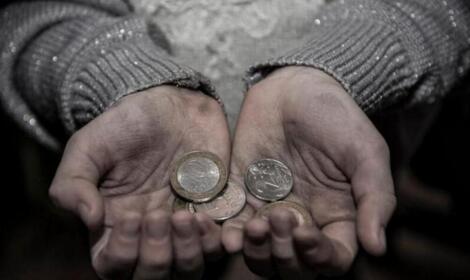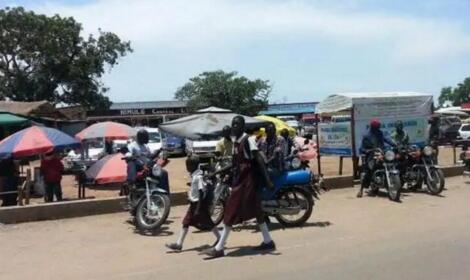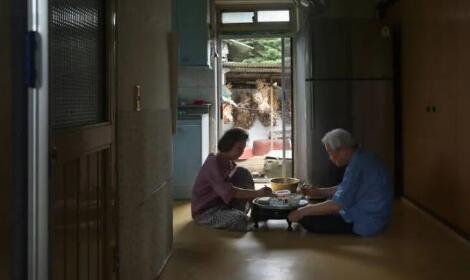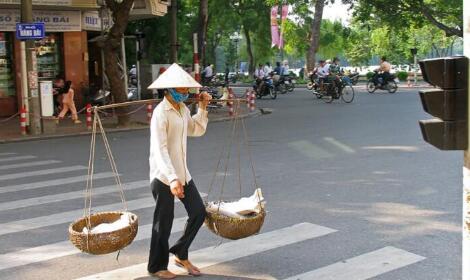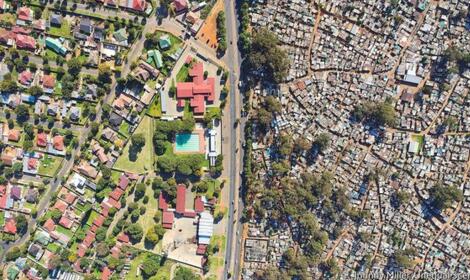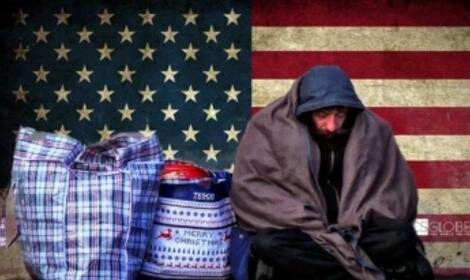为什么大多数穷人仍然贫穷(三)
正文翻译
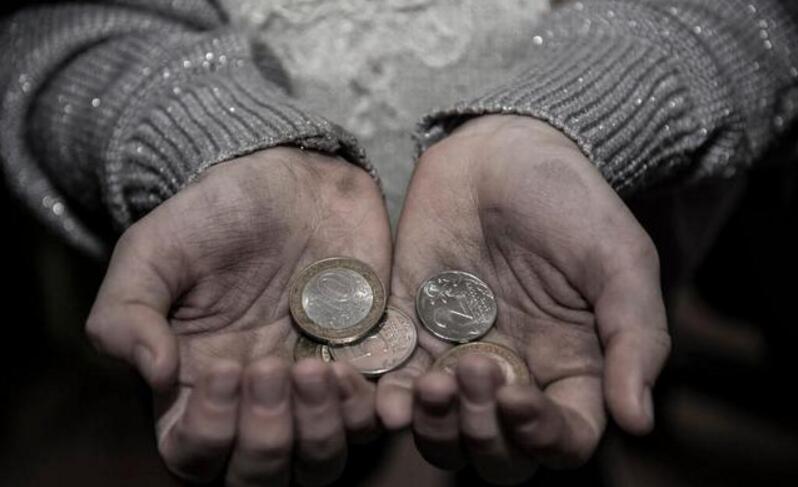
Why do most poor people remain poor?
为什么大多数穷人仍然贫穷?

Why do most poor people remain poor?
为什么大多数穷人仍然贫穷?
评论翻译
Subhash Kumar
I grew up in a lower middle class South Indian family. A well educated mom and a not so well educated but hard working dad. And there is my little sister who is 6 years younger to me.
While growing up in Hyderabad I have seen my mom working her guts off to make both ends meet. I particularly remember this because whenever the Principal of our school walked in to take names of students who are yet to pay the fees, my name was there by default. The memory is so stark that I clearly remember the only time my name wasn't called out. That day, I had a grin on my face. It felt as if I was set free after being caged for years.
Then came a high. My mom, while working as an Accountant started an HR consultancy firm which flourished and she made good money. But since she had an eternal spender as a life partner, she couldn't save much. Instead, the money made the wine sellers rich (If you know what I mean).
我在南印度的一个中下阶层家庭长大。有一位受过良好教育的母亲和一位没有受过很好的教育但工作努力的父亲。还有一个比我小6岁的妹妹。
当我在海得拉巴长大的时候,我看到我妈妈拼命工作以维持收支平衡。我特别记得这一点,因为每当我们学校的校长走进来通报那些尚未支付学费的学生名字时,我的名字总是在那里。记忆如此清晰,我清楚地记得我唯一一次没有被叫出名字的时刻。那天,我满脸笑容。感觉好像我被关在笼子里好几年,如今被释放了一样。
然后高潮来了。我妈妈在做会计时创办了一家人力资源咨询公司,生意兴隆,她赚了很多钱。但由于她有一个一直挥霍无度的终身伴侣,她没能存多少钱。相反,这些钱让卖酒的人发了财(如果你知道我的意思的话)。
Let me give you an example of how much she made during that period - She gifted me a TVS Scooty when I made it out of school. Mind you, this is year 2001.
During this period nobody would have foreseen a low. But it was around the corner. Year 2003, a tsunami in the disguise of my mom's deteriorating Health hit our family and what followed were the darkest days of our lives.
My dad took a decision. He decided to send us to our home town(while he stayed back), where he expected to receive financial and moral support from our relatives for my ailing mother. I had just finished my 12th and my sister had finished 6th grade. In a matter of few days, our lives had taken a U-turn.
Palakkad, Kerala. That's our home town.
让我给你举个例子,说明她在那段时间里赚了多少钱——当我离开学校时,她送给了我一台TVS Scooty。提醒你,这是2001年哦。
在此期间,没有人能预见到经济会出现低迷。但它就在拐角处,2003年,一场以我母亲健康恶化为伪装的海啸袭击了我们的家庭,随之而来的是我们生活中最黑暗的日子。
我爸爸做了一个决定。他决定把我们送到我们的家乡(而他留在那里),在那里,他希望我们的亲戚能为我生病的母亲提供经济和精神上的支持。我刚读完12年级,我姐姐已经读完6年级。在短短几天内,我们的生活发生了重大转折。
喀拉拉邦帕拉卡德—那是我们的家乡。
My sister joined school and I couldn't continue my studies. It came as a rude shock to me. Within no time I went from an effervescent kid to a silent gape addict. Looking at the financial and our mental situation my mother went in to depression. She also had lost 20 kgs by then. Day in and day out we were praying for her recovery. Before the situation could sink in, life took another blow at us. A massive one at that.
My dad could not manage his finances and became more aggressive than usual. He took decisions in a jiffy, one after another. Slowly there came a time where he could not send us a single rupee for our survival. In a short while we were asked to vacate our two room(one room and a kitchen) rented house because we couldn't pay the rent for 3 months straight.
We then moved in to a small hut.
It could not hold the rain. Sitting inside this house during the rains was like sitting under a tree. You don't get drenched but you are also not sitting inside closed doors and enjoying the rain.
我妹妹上学,我无法继续学业。这让我大吃一惊。没过多久,我就从一个活泼的孩子变成了一个沉默寡言的哈欠成天的瘾君子。看着我们的经济和心理状况,我母亲陷入了抑郁。那时,她还瘦了20公斤。我们日复一日地为她的康复进行祈祷。在这种情况发生之前,生活又给了我们一次打击,而且是一个巨大的打击。
我父亲无法管理自己的财务状况,变得比平时更加暴躁。他一下子做出了决定,一个接一个。慢慢地,有一段时间,他一个卢比都不能给我们来维持我们的生存。没过多久,我们就被要求搬出租住的两间房(一间房和一间厨房),因为我们已经连续三个月付不起房租了。
然后我们搬进了一间小茅屋。
它无法挡住雨。下雨时坐在房子里就像坐在树下一样。你不会被淋湿,但你也无法坐在关着的门里享受雨
The house didn't have electricity, no water connection, no well, no compound wall and no proper BATHROOM. With two women in the house, not having a proper bathroom was horrible. We stayed in this house for close to 4 months. These four months taught me the value of every single breath of life.
We ran out of money and food. One morning we woke up at about 5am and made black coffee for us, that's when my mom looked at my sis and me and said, "We don't have anything to eat for today". After a few minutes of pin-drop silence we looked at each other and burst out crying. We got in to a group hug and cried for almost an hour. Then, I went in to the room and picked up the Dish Drops (Utensil cleaner), Car Wash and Shampoo sachets that we had purchased as Amway Distributors few months ago. I had 20 of these sachets, each costing Rs.5/-. I saw an opportunity, I waited for the sun to rise.
As soon as it was early enough to go door to door, I started my journey. I went door to door selling these sachets. Where ever I saw a car I got in and spoke about the Car Wash. Where I saw women, I spoke to them about Dish Drops and Shampoos. I turned in to a determined 17yr old who wanted to feed his mom and sis. I was asked to leave at most places as they were not used to door to door salesmen. One man hurled a shoe at me for entering his gate. The shoe whistled past my ear. I think it must have kissed me on the way because I still remember how the shoe felt. It looked like a journey that would not end. I wiped many a tear off my face during this journey. But I did manage to sell a few sachets by noon, by which time I was so hungry that I felt I would faint.
房子没有电,没有水,没有井,没有复合墙,也没有合适的浴室。房子里有两个女人,没有一个合适的浴室是可怕的。我们在这所房子里住了将近4个月。这四个月教会了我生命中每一次呼吸的价值。
我们的钱和食物都用完了。一天早上,我们大约5点起床,为我们煮了黑咖啡,这时我妈妈看着我和妹妹说:“我们今天没有东西吃了。”。沉默了几分钟后,我们面面相觑,大哭起来。我们拥抱在一起,哭了将近一个小时。然后,我走进房间,拿起了几个月前我们作为安利经销商购买的洗碗机、洗车机和洗发水小袋。我有20个这样的小袋,每个售价5卢比。我看到了一个机会,我等待着太阳升起。
一到可以挨家挨户敲门的时候,我就开始了我工作。我挨家挨户地卖这些小袋。每当我看到一辆车,我就上前谈论洗车事宜。每当我看到女人时,我都会和她们谈论洗碗液和洗发水。我成为了一个坚定的17岁男孩,他想要养活他的妈妈和妹妹。大多数时候遇到的人都要求我离开,因为他们不习惯挨家挨户的推销员。一个人因为我进了他的大门,向我扔了一只鞋。鞋子从我耳边呼啸而过。我想它一定在当时吻了我,因为我还记得那只鞋的感觉。这似乎是一段不会结束的行程。在这次历程中,我擦掉了众多眼泪。但我确实设法在中午前卖掉了几袋,到那时我饿得要死了。
I stopped at a road side hotel which looked affordable to me. I sat there among masons & Carpenters who were working nearby, to eat. I had never been with such people. This was my first, tears started flowing and I ate my food with tears in my eyes. My first meal of the day was awesome. Its the best meal I have ever had. My meal cost me Rs.12/-.
I continued my walk until 4:30pm before I felt I had earned enough to buy rice. I took a bus back home and purchased 2kgs rice on the way. I paid Rs.10 per kg. While I was walking back home I held the rice close to my chest as if hugging a little baby. It was dear to me. My mom and my sis were waiting. When I reached home my mom and sis were elated. We burst in to tears again, which lasted a while.
After some time, I asked my mom, "What did you both eat?". Mom didn't respond. My cute little sister told me, "We went to our neighbour's and asked for some Papayas from their papaya tree, mom told aunty that I like Papayas. I dont like them but I ate it because I was hungry."
我在路边的一家旅馆停了下来,在我看来是负担得起的。我坐在附近工作的泥瓦匠和木匠中间吃饭。我从来没有和这样的人在一起过。这是我的第一次,泪水开始流淌,我含着泪水吃着食物。我今天的第一顿饭棒极了。这是我吃过的最好的一顿饭。这顿饭花了我12卢比。
我一直走到下午4点30分,直到我觉得自己挣到了足够买大米的钱。我乘公共汽车回家,途中以每公斤付了10卢比的价格买了2公斤大米。当我回家的时候,我把米饭紧紧地抱在胸前,好像抱着一个小婴儿。这对我来说很珍贵。我妈妈和我妹妹在等我。当我到家时,我妈妈和妹妹都很高兴。我们又哭了起来,持续了一会儿。
过了一段时间,我问妈妈:“你们俩吃了什么?”。妈妈没有回应。我可爱的小妹妹告诉我:“我们去邻居家,从他们的木瓜树上要了一些木瓜,妈妈告诉阿姨我喜欢木瓜。其实我不喜欢,但我吃了它,因为我饿了。”
Hearing this I just couldn't control myself. I cried and my sis said, "Don't worry brother, I won't ask for chocolates". The group hug was back again. We cried inconsolably for a very long time.
After this day, we never looked back. We somehow made it out of that hut. I found a job as a door to door salesman. My first pay cheque was for Rs.500/-. I remember packing it neatly in an envelope and handing it over to my mom.
I joined another company as salesman and one of my prospective clients made me realize that my english is good and I should be doing something else. I asked him to suggest. He said, "Call Centers".
I have written about how I met him in the below answer.
听到这个,我简直无法控制自己。我哭了,妹妹说:“别担心,哥哥,我不会要巧克力的。”。大家又拥抱在一起。我们伤心地哭了很长时间。
这一天之后,我们再也没有回头。我们不知怎的走出了那间小屋。我找到了一份上门推销员的工作。我的第一张工资支票是500卢比。我记得把它整齐地装在信封里,然后交给我妈妈。
我加入了另一家公司做推销员,我的一位潜在客户让我意识到我的英语很好,我应该做些别的事情。我请他提出建议。他说,“呼叫中心”。
我在下面的回答中写了我是如何认识他的。
We are now in 2005, two tough years had passed. We decided to move back to hyderabad.
After coming back I found my first job in a BPO after failing close to 30 interviews. How I made it is a story in itself. It took me 4 months. I joined HSBC's Data processing unit as a CSR.
My second innings had began.
Cut to 2014 and I am an HR Business partner with an IT firm. I finished my Graduation and am on the verge of completing my MBA through distance. I have been working since 2003 at a stretch. No breaks taken.
I had my head in the right place, still have. So never ever got carried away.
I have a calm demeanor and the confidence of a shooter who doesn't make too much noise while playing his sport. Just makes his gun do the talking.
我们现在是2005年,艰难的两年过去了。我们决定搬回海得拉巴。
回来后,我在一家商务流程外包公司找到了我的第一份工作,因为面试失败了近30次。我是如何做到的,这本身就是一个故事。我花了4个月的时间。我作为客户服务代表加入了汇丰的数据处理部门。
我的第二回合已经开始了。
2014年,我是一家IT公司的人力资源业务合作伙伴。我已经毕业了,即将通过远程学习获得MBA学位。我从2003年开始一直在工作,没有休息。
我的想法是正确的,现在仍然是。所以永远不要失去理智
我行事冷静,还有如同一名在打球时不会制造太多噪音的射手般的自信—只是用他的枪说话。
I respect every thing I have in life and value every rupee.
I show how much I love people around me without a bit of hesitation.
I talk very little and do more.
I don't think judging people is my business, so I don’t do it. I keep an open mind.
In the meantime I have also tried business and failed. So I have massive respect for people who create their own lives.
Most importantly I have retained the effervescence.
Life is about moving forward. Let's go together..!!
我尊重生活中的一切,珍惜每一卢比。
我毫不犹豫地表现出我有多爱身边的人。
我很少说话,更多的是行动。
我认为评判别人不是我要做的事,所以我不会这么干。我保持开放的心态。
与此同时,我也尝试过做生意,但失败了。所以我非常尊重那些创造自己生活的人。
最重要的是,我保持了这种活力。
生活就是向前迈进,让我们一起加油。
Anagha Meera Manoharan
When we appointed our maid she asked us if we could write her salary figure in a piece of paper and give her. She wanted to show it to her husband as some proof. And she didn't know how to write.
Few days later I asked her if she could come 15 minutes earlier every day so that I could teach her basic things at least, like Hindi and English letters and numbers.
This is the translation of what she said:
“Didi if I had 15 minutes to spare, I would be working in one more house.”
I didn't know how to respond to that. But that gave me perspective.
This is how poor people's lives are. They work hard. They're probably smart too. But they can't afford to stop for a while and change their path. They have to go by their schedule every day for sustaining. And hence they don't and can't think of doing anything different to be rich.
当我们指定我们的女佣时,她问我们是否可以把她的工资数字写在一张纸上并交给她。她想把它拿给丈夫看,作为证据。她不知道怎么写。
几天后,我问她能否每天提早15分钟来,这样我至少可以教她一些基本的东西,比如印地语、英语字母和数字。
以下是她的原话:
“迪迪,如果我有15分钟的空闲时间,我就会多干一分兼职。”
我不知道该如何回应,但这给了我新的视角。
这就是穷人的生活。他们努力工作,他们可能也很聪明。但他们不能停下来改变自己的道路。他们必须每天按照自己的时间表来维持生活。因此,他们不会也无法想到做任何不同的事情来致富。
Jon Mixon
An assessment:
A lack of inherited assets - If your parents were poor, there's a strong likelihood that you'll also be as you haven't been given any inherited wealth to cushion your climb up the financial ladder.
A lack of skills - Highly skilled people are rarely poor. This is because they have skills which can earn them wealth. People with few demonstrable skills are often poor for the inverse reason.
A lack of education - If you lack an education, you'll find a number of doors closed to you. Those closed doors represent opportunities to gain wealth which are closed off to you.
An addiction to substances - While there are more than a few people who are wealthy and who are addicted to substances, they have their wealth to cushion them from the effects of substance use/abuse.
Untreated or poorly mental or emotional illnesses - See substance addictions above. If you are mentally and/or emotionally ill, you are likely to also be poor.
评估:
缺乏继承财产-如果你的父母很穷,你很可能也会很穷,因为你没有得到任何继承财产来缓冲你的经济状况。
缺乏技能-高技能的人很少贫穷。这是因为他们拥有可以为他们赚取财富的技能。缺乏可展示技能的人往往因为相反的原因而贫穷。
缺乏教育—如果你缺乏教育,你会发现很多门都被堵上了。那些紧闭的门代表着获得财富的机会,而这些机会对你来说是封闭的。
物质成瘾——虽然有很多人富有并且对物质上瘾,但他们有自己的财富来减轻追求物质/滥用的影响。
未经治疗或不良的精神或情感疾病——见上文物质成瘾。如果你有精神和/或情绪问题,你很可能也很穷。
Geographic location - If you are located in remote areas or in small towns, you are likely to be poor. The opportunities which exist in larger cities simply don't exist those areas and thus you have to "make due" with whatever exists where you are at.
A lack of motivation - If you aren't motivated to constantly seek out new opportunities or to excel at what you are currently doing, you are likely to remain poor,.
Illiteracy - Similar to No. 3, but more extreme. Unless you are an exceptional person, if you cannot read nor write in the language which you speak, you will invariably be poor.
A lack of savings - Most people who are unable to save are doomed to a life of poverty. Because they are unable to create a financial cushion for themselves or their families, they are poor and they will almost certainly remain poor for the majority of their lives.
While not all of the above are present in every case of poverty, at least one element is and that is likely the cause of a person being poor.
地理位置—如果你位于偏远地区或小城镇,你很可能很穷。大城市中存在的机会根本不会存在于这些地区,因此你必须“充分利用”你所处地方的的一切。
缺乏动力—如果你没有动力去不断寻找新的机会或在你目前的工作中脱颖而出,你很可能会继续贫穷。
文盲—与第三名相似,但更极端。除非你是一个特殊的人,如果你不能用你所讲的语言读或写,你将永远贫穷。
缺乏储蓄—大多数没有储蓄能力的人注定要过贫困的生活。因为他们无法为自己或家人创造经济上的缓冲,所以他们很穷,而且几乎可以肯定,他们一生的大部分时间都将处于贫困状态。
虽然并非所有上述因素都存在于每一个贫困案例中,但至少有一个因素是并且很可能是此人贫困的原因。
Sara Tung
“Mom, there’s roaches in the chicken.”
My sister and I were staring at the roaches in our dinner. We always had a roach problem, but that summer when I was nine, the intense heat had brought on an unusual bloom of roaches. Mom had braised chicken wings in soy sauce for dinner Shanghai style. When she brought out dinner, my sister and I discovered a number of baby roaches in the bowl of wings.
Mom looked at the wings for a few seconds and said quietly, “pick them out,” before she turned and went back to the kitchen.
The cork on our bottle of cheap soy sauce had cracked the way it usually did halfway through the bottle and Mom had rolled a piece of paper and fashioned it into a paper cork. The tiny gaps in the makeshift cork were just big enough for baby roaches to get through.
My sister and I stared at the bowl of wings. The bodies of the baby roaches glistened as they floated in the soy sauce broth and clung to the wings.
“You’re going to move far away when you grow up,”
“妈妈,鸡里有蟑螂。”
我妹妹和我盯着晚餐里的蟑螂。我们家一直都有蟑螂的问题,但在我九岁那年的夏天,酷暑导致蟑螂不寻常地大量繁殖。妈妈做了上海风味的红烧鸡翅。当她端出晚餐时,我和姐姐在盛鸡翅的碗里发现了许多小强。
妈妈看了几秒钟翅膀,平静地说:“把它们挑出来。”然后她转身回到厨房。
我们那瓶廉价酱油的瓶塞在瓶口开到一半的时候就像往常一样破裂了,妈妈卷了一张纸,做成了一个软木塞。临时软木塞上的小缝隙刚好能让蟑螂通过。
我和妹妹盯着那碗翅膀。小蟑螂的身体在酱油汤中漂浮,紧贴着翅膀,闪闪发光。
你长大后要搬到很远的地方去,”。
I was eight, and the apartment was very cold. We were in the middle of an unusually cold winter, and the radiators in the old building couldn’t keep up. My sister, who didn’t get cold as easily, was watching TV in the other room. Even though it was only late afternoon, Mom and I had crawled under her covers to huddle for warmth.
I looked over at Mom and felt sad at the idea of being far away from her. I cuddled up to her affectionately and said, “No Mom, I’ll always stay by your side."
“I’ll give you $75.” The lady handed my mom the gold bracelet back after carefully inspecting it.
It was one of the few pieces Mom had left of the gifts she got on her wedding day.
“It’s worth at least $150,” Mom said.
The lady frowned and shook her head. “It’s not that heavy. I can only offer you $75.” she said.
Mom glanced at the six-year-old me. I looked back at her glassy-eyed, my face flushed with fever.
“I need to take her to the doctor,” Mom said.
The lady sighed. “$100. That’s the most I can give you.”
当时我八岁,公寓里很冷。我们正处于一个异常寒冷的冬天,老房子里的暖气片跟不上。我的妹妹不那么容易感冒,她正在另一个房间看电视。虽然已经是傍晚了,我和妈妈还是爬到她的被窝里挤在一起取暖。
我看着妈妈,一想到离她很远就感到难过。我深情地搂着她说:“不,妈妈,我会一直在你身边。”
“我给你75美元。”女士仔细检查了金手镯后,把它还给了我妈妈。
这是妈妈在婚礼当天收到的礼物中为数不多的几件之一。
“它至少值150美元,”妈妈说。
这位女士皱了皱眉头,摇了摇头。“没那么重。我只能给你75美元。”她说。
妈妈瞥了一眼六岁的我。我回头看了看她呆滞的眼睛,我的脸因发烧而发红。
“我需要带她去看医生,”妈妈说。
这位女士叹了口气。“100美元。我最多能给这么多钱。”
It wasn’t the first or the last item Mom would pawn.
“I’m hungry,” I said.
“Have an apple,” Mom said cheerfully.
I’d already had five apples that day and the thought of eating another made me nauseous.
We had taken a bus day tour and gone apple picking. For the past few years, Mom had looked wistfully at the apple picking flyers every time we passed by the travel agency a few blocks from our apartment. We’d finally saved enough to go. We had only brought containers of tap water with us for our day trip. Mom had reasoned there’d be plenty of apples to eat.
I looked at my sister and dad standing guard at the base of the apple tree, ready to catch the apples. I looked up at my mom perched high up in the apple tree, beaming down at us. I hadn’t seen Mom that happy in a long time, and her happiness was infectious.
My stomach growled. I picked up another apple and bit into it.
To this day, although I can’t stand the taste of them, apples still remind me fondly of my mother.
这不是妈妈会典当的第一件或最后一件物品。
“我饿了,”我说。
“吃个苹果吧,”妈妈高兴地说。
那天我已经吃了五个苹果,一想到再吃一个就恶心。
我们坐了巴士一日游,还去摘苹果了。在过去的几年里,每当我们经过离我们公寓几个街区远的旅行社时,妈妈总是若有所思地看着那些摘苹果的传单。我们终于攒够钱去了。我们只带了一日游用的桶装自来水。妈妈推断有很多苹果可以吃。
我看着我的妹妹和爸爸站在苹果树下守卫,准备接住苹果。我抬头看了看我妈妈,她高高地坐在苹果树上,面带微笑地看着我们。我很久没见过妈妈这么快乐了,她的快乐很有感染力。
我的肚子咕咕叫。我捡起另一个苹果,咬了一口。
直到今天,尽管我无法忍受苹果的味道,但苹果仍然让我想起我的母亲。
Forrest Harris
There is a little story.
One day, God stripped everyone of their wealth.
All the people were left without food and were hungry.
Three days later, God gave everyone a chicken.
The first group was overjoyed at the sight of the chicken and thought nothing of it, killing it and having a good meal, chattering in the sun. Other people did not make up their minds at first, but when they saw the enjoyable expressions of those who had eaten and drunk, they could not resist killing the chicken.
The second group was also very hungry, but some of them saw that they got a hen, they endured the hunger and raised the hen, who laid an egg every day, although not enough to eat, but also not starve. The people who took the rooster, but also dare not just eat, let their own rooster to wake up everyone to feed the hens every day, for an egg to eat.
有一个小故事。
有一天,上帝剥夺了每个人的财富。
所有的人都没有食物,都饿了。
三天后,上帝给了每个人一只鸡。
第一组人看到这只鸡时欣喜若狂,啥都没想,杀了它,吃了一顿丰盛的饭,在阳光下喋喋不休。其他人一开始并没有下定决心,但当他们看到那些吃喝玩乐的人的愉快表情时,他们忍不住要杀鸡。
第二组人也很饿,但他们中的一些人看到他们是有一只母鸡,他们忍着饥饿养育了母鸡,母鸡每天下一个蛋,虽然不够吃,但也不饿。拿了公鸡的人,还不敢随便吃,让自己的公鸡每天叫醒大家喂母鸡,只为换一个鸡蛋吃。
The last group of people left, found the second group of people, said let your rooster (hen) and my hen (rooster) mating, laying chicks. After the chicks grow up, they will lay an egg for you every day, how about that? The second group of people thought that they had nothing to lose anyway, and they also earned an egg for nothing, so they agreed.
And so it went on for a while.
The first group of people were hungry and skinny, and they were on the ground complaining about why God had stopped giving them a chicken.
The second group ate their eggs, got another egg from the third group, and lived their little lives with joy.
The third group harvested too many chicks to raise themselves, so they approached the first group and asked them if they would work for him and get an egg for their work.
A society of equality with one chicken per person at the beginning, as time passes, will once again appear the poor, the middle class and the rich. Gradually the prayer emerged in the society: Oh God, please take away everyone's property and give us back our fairness.
I think this story illustrates the point.
最后一组人走了,找到第二组人,说让你的鸡(母鸡)和我的鸡(公鸡)交配,养育小鸡。小鸡长大后,每天给你下一个蛋,怎么样?第二组人认为他们无论如何都没有什么可失去的,而且他们也免费赚了一个鸡蛋,所以他们同意了。
于是,它持续了一段时间。
第一组人又饿又瘦,他们在地上抱怨上帝为什么不给他们一只鸡。
第二组吃了他们的蛋,从第三组得到了另一个蛋,快乐地过着他们的小生活。
第三组收获了许多小鸡,自己无法养活,所以他们走近第一组,问他们是否愿意为他工作,并从他们的工作中得到一个鸡蛋。
随着时间的推移,一个开始人人有一只鸡的平等社会将再次出现穷人、中产阶级和富人。渐渐地,社会上出现了这样的祈祷:上帝啊,请拿走每个人的财产,还我们公平吧。
我认为这个故事说出了本质。
I grew up in a lower middle class South Indian family. A well educated mom and a not so well educated but hard working dad. And there is my little sister who is 6 years younger to me.
While growing up in Hyderabad I have seen my mom working her guts off to make both ends meet. I particularly remember this because whenever the Principal of our school walked in to take names of students who are yet to pay the fees, my name was there by default. The memory is so stark that I clearly remember the only time my name wasn't called out. That day, I had a grin on my face. It felt as if I was set free after being caged for years.
Then came a high. My mom, while working as an Accountant started an HR consultancy firm which flourished and she made good money. But since she had an eternal spender as a life partner, she couldn't save much. Instead, the money made the wine sellers rich (If you know what I mean).
我在南印度的一个中下阶层家庭长大。有一位受过良好教育的母亲和一位没有受过很好的教育但工作努力的父亲。还有一个比我小6岁的妹妹。
当我在海得拉巴长大的时候,我看到我妈妈拼命工作以维持收支平衡。我特别记得这一点,因为每当我们学校的校长走进来通报那些尚未支付学费的学生名字时,我的名字总是在那里。记忆如此清晰,我清楚地记得我唯一一次没有被叫出名字的时刻。那天,我满脸笑容。感觉好像我被关在笼子里好几年,如今被释放了一样。
然后高潮来了。我妈妈在做会计时创办了一家人力资源咨询公司,生意兴隆,她赚了很多钱。但由于她有一个一直挥霍无度的终身伴侣,她没能存多少钱。相反,这些钱让卖酒的人发了财(如果你知道我的意思的话)。
Let me give you an example of how much she made during that period - She gifted me a TVS Scooty when I made it out of school. Mind you, this is year 2001.
During this period nobody would have foreseen a low. But it was around the corner. Year 2003, a tsunami in the disguise of my mom's deteriorating Health hit our family and what followed were the darkest days of our lives.
My dad took a decision. He decided to send us to our home town(while he stayed back), where he expected to receive financial and moral support from our relatives for my ailing mother. I had just finished my 12th and my sister had finished 6th grade. In a matter of few days, our lives had taken a U-turn.
Palakkad, Kerala. That's our home town.
让我给你举个例子,说明她在那段时间里赚了多少钱——当我离开学校时,她送给了我一台TVS Scooty。提醒你,这是2001年哦。
在此期间,没有人能预见到经济会出现低迷。但它就在拐角处,2003年,一场以我母亲健康恶化为伪装的海啸袭击了我们的家庭,随之而来的是我们生活中最黑暗的日子。
我爸爸做了一个决定。他决定把我们送到我们的家乡(而他留在那里),在那里,他希望我们的亲戚能为我生病的母亲提供经济和精神上的支持。我刚读完12年级,我姐姐已经读完6年级。在短短几天内,我们的生活发生了重大转折。
喀拉拉邦帕拉卡德—那是我们的家乡。
My sister joined school and I couldn't continue my studies. It came as a rude shock to me. Within no time I went from an effervescent kid to a silent gape addict. Looking at the financial and our mental situation my mother went in to depression. She also had lost 20 kgs by then. Day in and day out we were praying for her recovery. Before the situation could sink in, life took another blow at us. A massive one at that.
My dad could not manage his finances and became more aggressive than usual. He took decisions in a jiffy, one after another. Slowly there came a time where he could not send us a single rupee for our survival. In a short while we were asked to vacate our two room(one room and a kitchen) rented house because we couldn't pay the rent for 3 months straight.
We then moved in to a small hut.
It could not hold the rain. Sitting inside this house during the rains was like sitting under a tree. You don't get drenched but you are also not sitting inside closed doors and enjoying the rain.
我妹妹上学,我无法继续学业。这让我大吃一惊。没过多久,我就从一个活泼的孩子变成了一个沉默寡言的哈欠成天的瘾君子。看着我们的经济和心理状况,我母亲陷入了抑郁。那时,她还瘦了20公斤。我们日复一日地为她的康复进行祈祷。在这种情况发生之前,生活又给了我们一次打击,而且是一个巨大的打击。
我父亲无法管理自己的财务状况,变得比平时更加暴躁。他一下子做出了决定,一个接一个。慢慢地,有一段时间,他一个卢比都不能给我们来维持我们的生存。没过多久,我们就被要求搬出租住的两间房(一间房和一间厨房),因为我们已经连续三个月付不起房租了。
然后我们搬进了一间小茅屋。
它无法挡住雨。下雨时坐在房子里就像坐在树下一样。你不会被淋湿,但你也无法坐在关着的门里享受雨
The house didn't have electricity, no water connection, no well, no compound wall and no proper BATHROOM. With two women in the house, not having a proper bathroom was horrible. We stayed in this house for close to 4 months. These four months taught me the value of every single breath of life.
We ran out of money and food. One morning we woke up at about 5am and made black coffee for us, that's when my mom looked at my sis and me and said, "We don't have anything to eat for today". After a few minutes of pin-drop silence we looked at each other and burst out crying. We got in to a group hug and cried for almost an hour. Then, I went in to the room and picked up the Dish Drops (Utensil cleaner), Car Wash and Shampoo sachets that we had purchased as Amway Distributors few months ago. I had 20 of these sachets, each costing Rs.5/-. I saw an opportunity, I waited for the sun to rise.
As soon as it was early enough to go door to door, I started my journey. I went door to door selling these sachets. Where ever I saw a car I got in and spoke about the Car Wash. Where I saw women, I spoke to them about Dish Drops and Shampoos. I turned in to a determined 17yr old who wanted to feed his mom and sis. I was asked to leave at most places as they were not used to door to door salesmen. One man hurled a shoe at me for entering his gate. The shoe whistled past my ear. I think it must have kissed me on the way because I still remember how the shoe felt. It looked like a journey that would not end. I wiped many a tear off my face during this journey. But I did manage to sell a few sachets by noon, by which time I was so hungry that I felt I would faint.
房子没有电,没有水,没有井,没有复合墙,也没有合适的浴室。房子里有两个女人,没有一个合适的浴室是可怕的。我们在这所房子里住了将近4个月。这四个月教会了我生命中每一次呼吸的价值。
我们的钱和食物都用完了。一天早上,我们大约5点起床,为我们煮了黑咖啡,这时我妈妈看着我和妹妹说:“我们今天没有东西吃了。”。沉默了几分钟后,我们面面相觑,大哭起来。我们拥抱在一起,哭了将近一个小时。然后,我走进房间,拿起了几个月前我们作为安利经销商购买的洗碗机、洗车机和洗发水小袋。我有20个这样的小袋,每个售价5卢比。我看到了一个机会,我等待着太阳升起。
一到可以挨家挨户敲门的时候,我就开始了我工作。我挨家挨户地卖这些小袋。每当我看到一辆车,我就上前谈论洗车事宜。每当我看到女人时,我都会和她们谈论洗碗液和洗发水。我成为了一个坚定的17岁男孩,他想要养活他的妈妈和妹妹。大多数时候遇到的人都要求我离开,因为他们不习惯挨家挨户的推销员。一个人因为我进了他的大门,向我扔了一只鞋。鞋子从我耳边呼啸而过。我想它一定在当时吻了我,因为我还记得那只鞋的感觉。这似乎是一段不会结束的行程。在这次历程中,我擦掉了众多眼泪。但我确实设法在中午前卖掉了几袋,到那时我饿得要死了。
I stopped at a road side hotel which looked affordable to me. I sat there among masons & Carpenters who were working nearby, to eat. I had never been with such people. This was my first, tears started flowing and I ate my food with tears in my eyes. My first meal of the day was awesome. Its the best meal I have ever had. My meal cost me Rs.12/-.
I continued my walk until 4:30pm before I felt I had earned enough to buy rice. I took a bus back home and purchased 2kgs rice on the way. I paid Rs.10 per kg. While I was walking back home I held the rice close to my chest as if hugging a little baby. It was dear to me. My mom and my sis were waiting. When I reached home my mom and sis were elated. We burst in to tears again, which lasted a while.
After some time, I asked my mom, "What did you both eat?". Mom didn't respond. My cute little sister told me, "We went to our neighbour's and asked for some Papayas from their papaya tree, mom told aunty that I like Papayas. I dont like them but I ate it because I was hungry."
我在路边的一家旅馆停了下来,在我看来是负担得起的。我坐在附近工作的泥瓦匠和木匠中间吃饭。我从来没有和这样的人在一起过。这是我的第一次,泪水开始流淌,我含着泪水吃着食物。我今天的第一顿饭棒极了。这是我吃过的最好的一顿饭。这顿饭花了我12卢比。
我一直走到下午4点30分,直到我觉得自己挣到了足够买大米的钱。我乘公共汽车回家,途中以每公斤付了10卢比的价格买了2公斤大米。当我回家的时候,我把米饭紧紧地抱在胸前,好像抱着一个小婴儿。这对我来说很珍贵。我妈妈和我妹妹在等我。当我到家时,我妈妈和妹妹都很高兴。我们又哭了起来,持续了一会儿。
过了一段时间,我问妈妈:“你们俩吃了什么?”。妈妈没有回应。我可爱的小妹妹告诉我:“我们去邻居家,从他们的木瓜树上要了一些木瓜,妈妈告诉阿姨我喜欢木瓜。其实我不喜欢,但我吃了它,因为我饿了。”
Hearing this I just couldn't control myself. I cried and my sis said, "Don't worry brother, I won't ask for chocolates". The group hug was back again. We cried inconsolably for a very long time.
After this day, we never looked back. We somehow made it out of that hut. I found a job as a door to door salesman. My first pay cheque was for Rs.500/-. I remember packing it neatly in an envelope and handing it over to my mom.
I joined another company as salesman and one of my prospective clients made me realize that my english is good and I should be doing something else. I asked him to suggest. He said, "Call Centers".
I have written about how I met him in the below answer.
听到这个,我简直无法控制自己。我哭了,妹妹说:“别担心,哥哥,我不会要巧克力的。”。大家又拥抱在一起。我们伤心地哭了很长时间。
这一天之后,我们再也没有回头。我们不知怎的走出了那间小屋。我找到了一份上门推销员的工作。我的第一张工资支票是500卢比。我记得把它整齐地装在信封里,然后交给我妈妈。
我加入了另一家公司做推销员,我的一位潜在客户让我意识到我的英语很好,我应该做些别的事情。我请他提出建议。他说,“呼叫中心”。
我在下面的回答中写了我是如何认识他的。
We are now in 2005, two tough years had passed. We decided to move back to hyderabad.
After coming back I found my first job in a BPO after failing close to 30 interviews. How I made it is a story in itself. It took me 4 months. I joined HSBC's Data processing unit as a CSR.
My second innings had began.
Cut to 2014 and I am an HR Business partner with an IT firm. I finished my Graduation and am on the verge of completing my MBA through distance. I have been working since 2003 at a stretch. No breaks taken.
I had my head in the right place, still have. So never ever got carried away.
I have a calm demeanor and the confidence of a shooter who doesn't make too much noise while playing his sport. Just makes his gun do the talking.
我们现在是2005年,艰难的两年过去了。我们决定搬回海得拉巴。
回来后,我在一家商务流程外包公司找到了我的第一份工作,因为面试失败了近30次。我是如何做到的,这本身就是一个故事。我花了4个月的时间。我作为客户服务代表加入了汇丰的数据处理部门。
我的第二回合已经开始了。
2014年,我是一家IT公司的人力资源业务合作伙伴。我已经毕业了,即将通过远程学习获得MBA学位。我从2003年开始一直在工作,没有休息。
我的想法是正确的,现在仍然是。所以永远不要失去理智
我行事冷静,还有如同一名在打球时不会制造太多噪音的射手般的自信—只是用他的枪说话。
I respect every thing I have in life and value every rupee.
I show how much I love people around me without a bit of hesitation.
I talk very little and do more.
I don't think judging people is my business, so I don’t do it. I keep an open mind.
In the meantime I have also tried business and failed. So I have massive respect for people who create their own lives.
Most importantly I have retained the effervescence.
Life is about moving forward. Let's go together..!!
我尊重生活中的一切,珍惜每一卢比。
我毫不犹豫地表现出我有多爱身边的人。
我很少说话,更多的是行动。
我认为评判别人不是我要做的事,所以我不会这么干。我保持开放的心态。
与此同时,我也尝试过做生意,但失败了。所以我非常尊重那些创造自己生活的人。
最重要的是,我保持了这种活力。
生活就是向前迈进,让我们一起加油。
Anagha Meera Manoharan
When we appointed our maid she asked us if we could write her salary figure in a piece of paper and give her. She wanted to show it to her husband as some proof. And she didn't know how to write.
Few days later I asked her if she could come 15 minutes earlier every day so that I could teach her basic things at least, like Hindi and English letters and numbers.
This is the translation of what she said:
“Didi if I had 15 minutes to spare, I would be working in one more house.”
I didn't know how to respond to that. But that gave me perspective.
This is how poor people's lives are. They work hard. They're probably smart too. But they can't afford to stop for a while and change their path. They have to go by their schedule every day for sustaining. And hence they don't and can't think of doing anything different to be rich.
当我们指定我们的女佣时,她问我们是否可以把她的工资数字写在一张纸上并交给她。她想把它拿给丈夫看,作为证据。她不知道怎么写。
几天后,我问她能否每天提早15分钟来,这样我至少可以教她一些基本的东西,比如印地语、英语字母和数字。
以下是她的原话:
“迪迪,如果我有15分钟的空闲时间,我就会多干一分兼职。”
我不知道该如何回应,但这给了我新的视角。
这就是穷人的生活。他们努力工作,他们可能也很聪明。但他们不能停下来改变自己的道路。他们必须每天按照自己的时间表来维持生活。因此,他们不会也无法想到做任何不同的事情来致富。
Jon Mixon
An assessment:
A lack of inherited assets - If your parents were poor, there's a strong likelihood that you'll also be as you haven't been given any inherited wealth to cushion your climb up the financial ladder.
A lack of skills - Highly skilled people are rarely poor. This is because they have skills which can earn them wealth. People with few demonstrable skills are often poor for the inverse reason.
A lack of education - If you lack an education, you'll find a number of doors closed to you. Those closed doors represent opportunities to gain wealth which are closed off to you.
An addiction to substances - While there are more than a few people who are wealthy and who are addicted to substances, they have their wealth to cushion them from the effects of substance use/abuse.
Untreated or poorly mental or emotional illnesses - See substance addictions above. If you are mentally and/or emotionally ill, you are likely to also be poor.
评估:
缺乏继承财产-如果你的父母很穷,你很可能也会很穷,因为你没有得到任何继承财产来缓冲你的经济状况。
缺乏技能-高技能的人很少贫穷。这是因为他们拥有可以为他们赚取财富的技能。缺乏可展示技能的人往往因为相反的原因而贫穷。
缺乏教育—如果你缺乏教育,你会发现很多门都被堵上了。那些紧闭的门代表着获得财富的机会,而这些机会对你来说是封闭的。
物质成瘾——虽然有很多人富有并且对物质上瘾,但他们有自己的财富来减轻追求物质/滥用的影响。
未经治疗或不良的精神或情感疾病——见上文物质成瘾。如果你有精神和/或情绪问题,你很可能也很穷。
Geographic location - If you are located in remote areas or in small towns, you are likely to be poor. The opportunities which exist in larger cities simply don't exist those areas and thus you have to "make due" with whatever exists where you are at.
A lack of motivation - If you aren't motivated to constantly seek out new opportunities or to excel at what you are currently doing, you are likely to remain poor,.
Illiteracy - Similar to No. 3, but more extreme. Unless you are an exceptional person, if you cannot read nor write in the language which you speak, you will invariably be poor.
A lack of savings - Most people who are unable to save are doomed to a life of poverty. Because they are unable to create a financial cushion for themselves or their families, they are poor and they will almost certainly remain poor for the majority of their lives.
While not all of the above are present in every case of poverty, at least one element is and that is likely the cause of a person being poor.
地理位置—如果你位于偏远地区或小城镇,你很可能很穷。大城市中存在的机会根本不会存在于这些地区,因此你必须“充分利用”你所处地方的的一切。
缺乏动力—如果你没有动力去不断寻找新的机会或在你目前的工作中脱颖而出,你很可能会继续贫穷。
文盲—与第三名相似,但更极端。除非你是一个特殊的人,如果你不能用你所讲的语言读或写,你将永远贫穷。
缺乏储蓄—大多数没有储蓄能力的人注定要过贫困的生活。因为他们无法为自己或家人创造经济上的缓冲,所以他们很穷,而且几乎可以肯定,他们一生的大部分时间都将处于贫困状态。
虽然并非所有上述因素都存在于每一个贫困案例中,但至少有一个因素是并且很可能是此人贫困的原因。
Sara Tung
“Mom, there’s roaches in the chicken.”
My sister and I were staring at the roaches in our dinner. We always had a roach problem, but that summer when I was nine, the intense heat had brought on an unusual bloom of roaches. Mom had braised chicken wings in soy sauce for dinner Shanghai style. When she brought out dinner, my sister and I discovered a number of baby roaches in the bowl of wings.
Mom looked at the wings for a few seconds and said quietly, “pick them out,” before she turned and went back to the kitchen.
The cork on our bottle of cheap soy sauce had cracked the way it usually did halfway through the bottle and Mom had rolled a piece of paper and fashioned it into a paper cork. The tiny gaps in the makeshift cork were just big enough for baby roaches to get through.
My sister and I stared at the bowl of wings. The bodies of the baby roaches glistened as they floated in the soy sauce broth and clung to the wings.
“You’re going to move far away when you grow up,”
“妈妈,鸡里有蟑螂。”
我妹妹和我盯着晚餐里的蟑螂。我们家一直都有蟑螂的问题,但在我九岁那年的夏天,酷暑导致蟑螂不寻常地大量繁殖。妈妈做了上海风味的红烧鸡翅。当她端出晚餐时,我和姐姐在盛鸡翅的碗里发现了许多小强。
妈妈看了几秒钟翅膀,平静地说:“把它们挑出来。”然后她转身回到厨房。
我们那瓶廉价酱油的瓶塞在瓶口开到一半的时候就像往常一样破裂了,妈妈卷了一张纸,做成了一个软木塞。临时软木塞上的小缝隙刚好能让蟑螂通过。
我和妹妹盯着那碗翅膀。小蟑螂的身体在酱油汤中漂浮,紧贴着翅膀,闪闪发光。
你长大后要搬到很远的地方去,”。
I was eight, and the apartment was very cold. We were in the middle of an unusually cold winter, and the radiators in the old building couldn’t keep up. My sister, who didn’t get cold as easily, was watching TV in the other room. Even though it was only late afternoon, Mom and I had crawled under her covers to huddle for warmth.
I looked over at Mom and felt sad at the idea of being far away from her. I cuddled up to her affectionately and said, “No Mom, I’ll always stay by your side."
“I’ll give you $75.” The lady handed my mom the gold bracelet back after carefully inspecting it.
It was one of the few pieces Mom had left of the gifts she got on her wedding day.
“It’s worth at least $150,” Mom said.
The lady frowned and shook her head. “It’s not that heavy. I can only offer you $75.” she said.
Mom glanced at the six-year-old me. I looked back at her glassy-eyed, my face flushed with fever.
“I need to take her to the doctor,” Mom said.
The lady sighed. “$100. That’s the most I can give you.”
当时我八岁,公寓里很冷。我们正处于一个异常寒冷的冬天,老房子里的暖气片跟不上。我的妹妹不那么容易感冒,她正在另一个房间看电视。虽然已经是傍晚了,我和妈妈还是爬到她的被窝里挤在一起取暖。
我看着妈妈,一想到离她很远就感到难过。我深情地搂着她说:“不,妈妈,我会一直在你身边。”
“我给你75美元。”女士仔细检查了金手镯后,把它还给了我妈妈。
这是妈妈在婚礼当天收到的礼物中为数不多的几件之一。
“它至少值150美元,”妈妈说。
这位女士皱了皱眉头,摇了摇头。“没那么重。我只能给你75美元。”她说。
妈妈瞥了一眼六岁的我。我回头看了看她呆滞的眼睛,我的脸因发烧而发红。
“我需要带她去看医生,”妈妈说。
这位女士叹了口气。“100美元。我最多能给这么多钱。”
It wasn’t the first or the last item Mom would pawn.
“I’m hungry,” I said.
“Have an apple,” Mom said cheerfully.
I’d already had five apples that day and the thought of eating another made me nauseous.
We had taken a bus day tour and gone apple picking. For the past few years, Mom had looked wistfully at the apple picking flyers every time we passed by the travel agency a few blocks from our apartment. We’d finally saved enough to go. We had only brought containers of tap water with us for our day trip. Mom had reasoned there’d be plenty of apples to eat.
I looked at my sister and dad standing guard at the base of the apple tree, ready to catch the apples. I looked up at my mom perched high up in the apple tree, beaming down at us. I hadn’t seen Mom that happy in a long time, and her happiness was infectious.
My stomach growled. I picked up another apple and bit into it.
To this day, although I can’t stand the taste of them, apples still remind me fondly of my mother.
这不是妈妈会典当的第一件或最后一件物品。
“我饿了,”我说。
“吃个苹果吧,”妈妈高兴地说。
那天我已经吃了五个苹果,一想到再吃一个就恶心。
我们坐了巴士一日游,还去摘苹果了。在过去的几年里,每当我们经过离我们公寓几个街区远的旅行社时,妈妈总是若有所思地看着那些摘苹果的传单。我们终于攒够钱去了。我们只带了一日游用的桶装自来水。妈妈推断有很多苹果可以吃。
我看着我的妹妹和爸爸站在苹果树下守卫,准备接住苹果。我抬头看了看我妈妈,她高高地坐在苹果树上,面带微笑地看着我们。我很久没见过妈妈这么快乐了,她的快乐很有感染力。
我的肚子咕咕叫。我捡起另一个苹果,咬了一口。
直到今天,尽管我无法忍受苹果的味道,但苹果仍然让我想起我的母亲。
Forrest Harris
There is a little story.
One day, God stripped everyone of their wealth.
All the people were left without food and were hungry.
Three days later, God gave everyone a chicken.
The first group was overjoyed at the sight of the chicken and thought nothing of it, killing it and having a good meal, chattering in the sun. Other people did not make up their minds at first, but when they saw the enjoyable expressions of those who had eaten and drunk, they could not resist killing the chicken.
The second group was also very hungry, but some of them saw that they got a hen, they endured the hunger and raised the hen, who laid an egg every day, although not enough to eat, but also not starve. The people who took the rooster, but also dare not just eat, let their own rooster to wake up everyone to feed the hens every day, for an egg to eat.
有一个小故事。
有一天,上帝剥夺了每个人的财富。
所有的人都没有食物,都饿了。
三天后,上帝给了每个人一只鸡。
第一组人看到这只鸡时欣喜若狂,啥都没想,杀了它,吃了一顿丰盛的饭,在阳光下喋喋不休。其他人一开始并没有下定决心,但当他们看到那些吃喝玩乐的人的愉快表情时,他们忍不住要杀鸡。
第二组人也很饿,但他们中的一些人看到他们是有一只母鸡,他们忍着饥饿养育了母鸡,母鸡每天下一个蛋,虽然不够吃,但也不饿。拿了公鸡的人,还不敢随便吃,让自己的公鸡每天叫醒大家喂母鸡,只为换一个鸡蛋吃。
The last group of people left, found the second group of people, said let your rooster (hen) and my hen (rooster) mating, laying chicks. After the chicks grow up, they will lay an egg for you every day, how about that? The second group of people thought that they had nothing to lose anyway, and they also earned an egg for nothing, so they agreed.
And so it went on for a while.
The first group of people were hungry and skinny, and they were on the ground complaining about why God had stopped giving them a chicken.
The second group ate their eggs, got another egg from the third group, and lived their little lives with joy.
The third group harvested too many chicks to raise themselves, so they approached the first group and asked them if they would work for him and get an egg for their work.
A society of equality with one chicken per person at the beginning, as time passes, will once again appear the poor, the middle class and the rich. Gradually the prayer emerged in the society: Oh God, please take away everyone's property and give us back our fairness.
I think this story illustrates the point.
最后一组人走了,找到第二组人,说让你的鸡(母鸡)和我的鸡(公鸡)交配,养育小鸡。小鸡长大后,每天给你下一个蛋,怎么样?第二组人认为他们无论如何都没有什么可失去的,而且他们也免费赚了一个鸡蛋,所以他们同意了。
于是,它持续了一段时间。
第一组人又饿又瘦,他们在地上抱怨上帝为什么不给他们一只鸡。
第二组吃了他们的蛋,从第三组得到了另一个蛋,快乐地过着他们的小生活。
第三组收获了许多小鸡,自己无法养活,所以他们走近第一组,问他们是否愿意为他工作,并从他们的工作中得到一个鸡蛋。
随着时间的推移,一个开始人人有一只鸡的平等社会将再次出现穷人、中产阶级和富人。渐渐地,社会上出现了这样的祈祷:上帝啊,请拿走每个人的财产,还我们公平吧。
我认为这个故事说出了本质。

